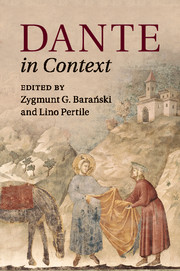Book contents
- Frontmatter
- Dedication
- Contents
- List of illustrations
- List of maps
- Notes on contributors
- Chronology
- Abbreviations and note on translations
- Introduction
- Part I Politics and society
- Part II Intellectual traditions
- 9 Philosophy and theology
- 10 Moral philosophy
- 11 Natural philosophy
- 12 Medicine
- 13 Islamic and Jewish influences
- 14 Cosmology, geography, and cartography
- Part III Linguistic and literary cultures
- Part IV Visual and performative culture
- Part V Dante: life, works, and reception
- Further reading
- Index
12 - Medicine
from Part II - Intellectual traditions
Published online by Cambridge University Press: 05 October 2015
- Frontmatter
- Dedication
- Contents
- List of illustrations
- List of maps
- Notes on contributors
- Chronology
- Abbreviations and note on translations
- Introduction
- Part I Politics and society
- Part II Intellectual traditions
- 9 Philosophy and theology
- 10 Moral philosophy
- 11 Natural philosophy
- 12 Medicine
- 13 Islamic and Jewish influences
- 14 Cosmology, geography, and cartography
- Part III Linguistic and literary cultures
- Part IV Visual and performative culture
- Part V Dante: life, works, and reception
- Further reading
- Index
Summary
In 1293 the Venetian councillors drew up a contract that they hoped would allow them to acquire the services of the famous Bolognese medical master Taddeo Alderotti (1223–95). They agreed to pay him 47 lire di grossi annually (an exceptionally large sum, surely the result of his academic distinction) if he would move to their city, although they imposed a few conditions on him: he could leave the city for only ten days a year without the permission of the council; he would bring with him two assistants who would serve the poor for free; he would be allowed to charge no more than 10 soldi di grossi for treating any illness except an abscessed liver, arthritis, leprosy, or dropsy; he would give free medical advice to Venetian nobles who sought him out at his home; and if an epidemic broke out in the city, he would publish information to the citizenry as to how to protect themselves from it. Taddeo seems to have decided against the move, dying in Bologna two years later.
Fourteen years later, in late 1307, the citizens of Castelló d'Empúries, a town of perhaps 3,000 people on the Mediterranean coast 90 miles north of Barcelona, decided that they wanted their former physician, Bernat de Berriac (d. after 1343), to return to care for them. Bernat was a student in the prestigious medical faculty at Montpellier who had taken time off to practise medicine in that Catalan town from 1303 to 1305 before leaving for another post at Vic, in the hills to the southwest; now Castelló was willing to make him a generous offer if he would come back, and in November Bernat signed a contract with the town. The consuls agreed that if he would make his residence in Castelló, they would pay him 300 sous every year in return for his promise to examine without charge the urines of everyone who came to him and to advise them generally on bloodletting, diet, and other features of a healthy regimen; but he was not obliged to visit the sick in their homes. He was not to leave Castelló without their permission, except that he was explicitly allowed to take three winters off, from All Saints' Day until Sexagesima (roughly November to March), in order to return to Montpellier to complete his studies for the master's degree.
- Type
- Chapter
- Information
- Dante in Context , pp. 189 - 199Publisher: Cambridge University PressPrint publication year: 2015

